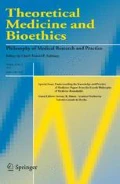Abstract
This paper suggests that the paradigm of lived body (as it is developed in the works of Merleau-Ponty, Sartre and Zaner) provides important insights into the experience of illness. In particular it is noted that, as embodied persons, we experience illness primarily as a disruption of lived body rather than as a dysfunction of biological body. An account is given of the manner in which such fundamental features of embodiment as bodily intentionality, primary meaning, contextural organization, body image, gestural display, lived spatiality and temporality, are disrupted in illness causing a concurrent disorganization of the patient's self and world. The paradigm of lived body has important applications for medical practice. It provides a fuller account of illness than does the prevailing reductionist Cartesian paradigm of body, more directly addresses the existential predicament of illness, and orients the clinical focus around the personhood of the patient.
Similar content being viewed by others
Author information
Authors and Affiliations
Rights and permissions
About this article
Cite this article
Toombs, S.K. Illness and the paradigm of lived body. Theor Med Bioeth 9, 201–226 (1988). https://doi.org/10.1007/BF00489413
Issue Date:
DOI: https://doi.org/10.1007/BF00489413




